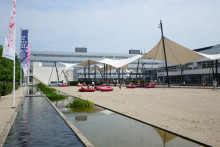Wageningen is the new Dutch number one. It has taken over the lead from Delft, which drops nine places to a shared 67th position with Leiden. Vrije Universiteit Amsterdam has made the biggest leap forward, rising from 166 to 138. Eindhoven has lost the most ground, dropping from 167 to 186.
The ranking looks not only at universities’ reputation, but also their staff-to-student ratio, the number of international students and tutors, cooperation with the business community and the impact of their scientific research. Dutch universities generally score well on citation impact, but lag behind when it comes to their educational environment. The business community has also been contributing less to research in recent years.
‘The Netherlands’ performance is still very impressive,’ says ranking compiler Phil Baty, ‘but the direction of travel is concerning.’ In his view, the Dutch universities have some serious obstacles to overcome, especially with regard to accessibility for foreign students and academics.
Dip
According to the University of Twente (UT), one reason why it and the other Dutch technical universities, Delft and Eindhoven, have fallen back in this year’s rankings is their decreasing citation impact. A one-off dip in the number of PhD graduations and a growth in student numbers – which depresses the staff-to-student ratio score – also play a role, explains a spokesperson for the university.
Nevertheless, Twente still claims to be a world leader. ‘Given the young age of the UT and our modest size,’ says the spokesperson, ‘we are vulnerable to newcomers. Also, small changes to the scores can have major repercussions for our position.’ The university plans to focus even more strongly on publications in international scientific journals and intends to restore the numerical balance between students and academic staff. The resources being reserved by the Dutch government for the technical universities will help with this.
Superpowers
The rise of Asian universities in the Times Higher Education rankings continues unabated: the number in this year’s top 200 has risen from two to 24. Baty emphasises, however, that the so-called ‘Anglo-Saxon superpowers’ are not going to give up their lead any time soon. Oxford in the UK retains the number-one spot for the fourth year in a row, and the United States dominates the list with 60 institutions in the top 200 – fourteen of them among the first twenty.
Due to the fierce international competition, many European universities have slipped down the league table. ‘Economic instability and increasingly isolationist political tendencies on the continent threaten to undermine a great deal of the excellent work done by European universities’, says Baty. For Europe to continue to perform well, it must keep on attracting leading academics through investment in research as well as providing a welcoming environment for ‘people from all sections of the population’.
Of course, rankings of this kind also attract criticism. There are claims, for example, that researchers and universities use a variety of tricks to improve their scores. Moreover, educational achievements play little or no part in the assessments.







